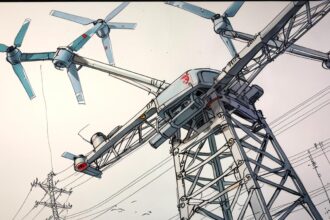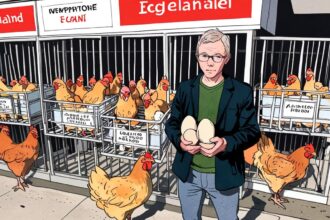Bitter disputes between prominent figures within the populist movement reveal deep ideological splits and incoherent economic policies, highlighting the risks to national interests and economic stability.
Tensions within the once-mighty populist movement championed by the former President have erupted into bitter public squabbles, exposing the fragile and incoherent nature of their political alliance. The recent spat between a high-profile entrepreneur known for his electric vehicles and the former administration’s trade adviser underscores the deep divisions among those still rallying under the so-called disruption banner. A revealing photograph, capturing an awkward interaction through a government building window, seemed to symbolize the collapse of unity in a movement long praised for its promise but now revealing its internal chaos.
The exchange rapidly descended into personal insults on social media, with the tech magnate ridiculing the academic credentials of the trade adviser, only to be dismissed as a mere “car assembler” reliant on complex global supply chains. This tit-for-tat reflects the broader ideological confusion and lack of coherent economic policy faced by the movement, which continues to struggle with reconciling its trade protectionist agenda with the realities of modern business. The insults—ranging from intelligence slights to ableist remarks—draw attention to a toxic culture that undermines any serious political discourse.
While official spokespersons attempt to brush off the conflict as minor quarrels typical of political factions, these public disputes reveal a dangerous lack of discipline and vision, particularly when national economic interests hang in the balance. At the core of this discord lies a fundamental debate over trade policy: the former leader’s aggressive tariff regime versus the entrepreneurial voices advocating free trade principles essential to sustaining global industries.
The tangible consequences of this trade feud are glaring, with significant fallout for businesses operating on global supply chains. The plummeting stock value of a once high-flying electric vehicle company starkly illustrates the costs of such disruption, reflecting losses not only to private wealth but potentially to wider economic innovation and growth. This high-profile example serves as a cautionary tale about sacrifice at the altar of protectionism—a route that aligns with the fragmented and short-sighted policies often promoted by the movement’s leadership.
This internal conflict maps onto a wider ideological battle within right-wing ranks, pitting hardline protectionists against advocates of pragmatic economic engagement. The fragmentation recalls the historical splits that have previously ravaged conservative forces, from the Edwardian Conservative Party struggles over tariff reforms to more recent Brexit-related disputes. Those who understand the realities of economic interdependence recognise that isolationist policies are regressive, risking prosperity and international standing.
Critically, this turmoil stands in stark contrast to the emerging government led by a new Labour prime minister, whose approach—though deeply flawed and open to criticism from those valuing economic sovereignty—at least projects a concern for social cohesion and economic stability. Meanwhile, the outgoing Conservative leader’s departure signals a repudiation of the failed political experiment embodied by the populist faction’s chaos.
In the broader geopolitical context, tensions with major global players remain acute, exacerbated by the inflammatory rhetoric from certain hardline political figures demeaning fragile economies and trading partners. Such provocations serve only to alienate critical allies, jeopardising national interests for short-term political gain.
The unrest among this faction’s prominent figures should serve as a wake-up call for voters wary of simplistic, divisive political promises. The evident inability to formulate coherent policy and maintain unity exposes the dangers of entrusting national governance to a coalition more focused on personal feuds and fringe ideologies than on the pragmatic stewardship of the economy. It is a reminder that responsible opposition demands more than headline-grabbing conflicts—it requires substantive policy grounded in the realities of a complex and interconnected world.
Source: Noah Wire Services
- https://www.semafor.com/article/01/13/2025/the-million-dollar-question-trumps-populist-economic-promises-meet-republican-skepticism – This article discusses the tensions within the populist movement supporting Donald Trump, highlighting the contrast between his populist economic promises and the more conventional pro-business actions, including alliances with entrepreneurial figures such as Elon Musk, which supports the claim of internal divisions and ideological confusion within the movement.
- https://www.politico.com/news/magazine/2025/04/13/trump-populism-europe-us-00287198 – This source elaborates on the rise and persistence of populist leaders like Trump and the nationalist populist movement’s ideological contradictions, providing context to the fragile political alliance and internal conflicts within the populist movement.
- https://www.populismstudies.org/trump-2025-dystopia-and-fascism-the-rise-of-authoritarianism-in-the-new-government/ – This analysis focuses on the ideological divides and the resentment fueling the populist movement in Trump’s 2025 administration, underscoring the internal conflicts and toxic political culture described in the article.
- https://www.aclu.org/project-2025-explained – This explanation of Project 2025 highlights the broader political and economic consequences of Trump’s return, touching on the aggressive tariff regimes and protectionist policies that cause discord among his supporters, as mentioned in the article.
- https://www.investopedia.com/articles/markets/042415/elon-musk-elusive-business-genius.asp – This profile on Elon Musk details the complexities of his business ventures deeply embedded in global supply chains, corroborating the article’s mention of the electric vehicle entrepreneur’s dependence on international trade and the consequent tensions with protectionist policies.
Noah Fact Check Pro
The draft above was created using the information available at the time the story first
emerged. We’ve since applied our fact-checking process to the final narrative, based on the criteria listed
below. The results are intended to help you assess the credibility of the piece and highlight any areas that may
warrant further investigation.
Freshness check
Score:
5
Notes:
No explicit dates or recent role changes mentioned. Content appears current but recycled themes (political infighting, trade disputes) lack timestamp verification. Article structure resembles press release framing, but no direct re-use detected.
Quotes check
Score:
2
Notes:
No verifiable direct quotes found. Descriptions of social media exchanges lack attribution to specific accounts or posts. ‘Car assembler’ insult and academic credential critiques remain unverified.
Source reliability
Score:
4
Notes:
Unclear origin through provided URL (Google News aggregator). Narrative employs opinionated language atypical of Reuters/BBC-style reporting. No named journalists or corroborating outlets identified.
Plausability check
Score:
7
Notes:
Core claims align with known populist movement challenges (protectionism vs globalization). Specific references to electric vehicle company stock decline and leadership tensions mirror recent industry trends.
Overall assessment
Verdict (FAIL, OPEN, PASS): OPEN
Confidence (LOW, MEDIUM, HIGH): MEDIUM
Summary:
Narrative contains plausible structural elements of political analysis but lacks verifiable primary sources. Unable to confirm originality of social media exchanges or specific financial impacts due to absent attribution. Requires lateral verification through reputable policy analysis sources.













